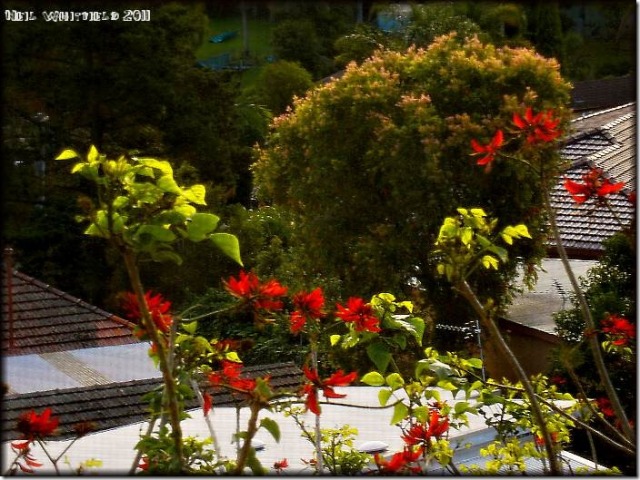Such a good title! A student of secondary teaching at Melbourne University has just started an edublog with that name.
No matter how fancy or whizz-bang our teaching presentations or animations of enzymes are, if we can’t get the kids listening and engaged we may as well try can-can dancing up and down the classroom with sparklers in our hair.
I am currently teaching two rather rowdy classes in Year 8 and Year 9, and have been learning the fundamental lesson that no matter what wonderful things you have planned to teach, you can’t actually teach them if you can’t effectively manage classroom dynamics. As my Year 7s and Year 11s last semester were much more manageable, this is my first real test of my behaviour management techniques, and it’s a bit of a learning curve.
Kristy’s first post led me to Teaching the iGeneration by Larry Rosen.
Studying generational similarities and differences can be tricky; no individual completely fits the profile of a particular generation. But research suggests that the majority of people born between a rough set of dates actually do share many characteristics (see Strauss & Howe, 1991).
Those born between about 1925 and 1946 are often called the Traditional or Silent generation. Growing up through the Great Depression, World War II, and the Cold War, they are characterized by a belief in common goals and respect for authority. The Baby Boomer generation, born between 1946 and 1964, tends to be optimistic, idealistic, and communicative and to value education and consumer goods. The next generation, born between 1965 and 1979, were defined by Douglas Coupland (1991) as Generation X in his book of the same name; the label X signifies that, compared with the Baby Boomers, Gen Xers are not as easily categorized.
With the 1980s and the birth of the World Wide Web, the power of cyberspace came to the masses and a new generation of web surfers, very different from their predecessors, was born. The most common label for this generation is Generation Y, simply meaning the generation after X. Some people stretch this generation past 1999 and refer to its members as Millennials. To me, these names are an insult to our first true cybergeneration. This generation should not be defined by the next letter in the alphabet or by the turn of the century. I believe that Don Tapscott’s (1999) term—the Net Generation—better reflects the impact of the Internet on the lives of its members.
On the basis of our research with thousands of teenagers and their parents, my colleagues and I have identified a separate generation, born in the 1990s and beyond, which we label the iGeneration. The irepresents both the types of digital technologies popular with children and adolescents (iPhone, iPod, Wii, iTunes, and so on) and the highly individualized activities that these technologies make possible. Children and youth in this new generation are defined by their technology and media use, their love of electronic communication, and their need to multitask.
Parenthetically, we are just starting to examine a separate minigeneration of kids like Mikey and Brittani, who not only are facile with individualized mobile technologies, but also have the expectation that if they conceive of something, they should be able to make it happen. If an app doesn’t exist for something they want to do on a smartphone, they just assume that nobody has created it yet and that it should be a piece of cake to do so. All in all, a fascinating minigeneration.
Good stuff, but one can’t help wondering at the odd parochialism in such things. All I have to do to see that is talk to M who was born in Shanghai in 1962!
In yesterday’s Sydney Morning Herald was an article about Birrong Girls High.
Students using blogs to express their creativity are coming out of their shells, writes Melissa Lahoud.
Speaking out in class can be daunting for some but high among the benefits of blogging in schools is the platform it provides for shy students to come out of their shells and express their thoughts more freely.
Birrong Girls High School in south-western Sydney is one school taking to blogging in a big way and Victor Davidson, a teacher and librarian, has developed hundreds of online learning spaces for his students.
”Some of our brightest and most articulate students, who often shy away from face-to-face conversations, have developed an active and dynamic presence online,” Davidson says.
Student Kristine King, 13, uses the blog to channel her creativity when writing stories and her confidence has surged since reading the positive responses…
Good work there! I did wonder how it meshes with what Thomas is doing – see Edublogging and I–with an aside on classroom management‘.

Gratuitous view from my window yesterday afternoon
Top reads here in August 2011
- Home page 1,557 views
- Australia’s Got Talent 2011 Grand Final 466
- Jack Vidgen–Australia’s Got Talent last night 448
- Being Australian 16: inclusive multiculturalism Aussie style 9 – my tribes 152
- Nostalgia and the globalising world — from Thomas Hardy to 2010 121
- The Rainbow Warrior 81
- A very personal Australia Day 26 January – my family 76
- Australia’s Got Talent 2011 Grand Final — my top 5 74
- Who to vote for on last night’s Australia’s Got Talent 64
- I’m feeling justified in the matter of David Hicks 63
- Leaky Boat: the documentary 48
- 1968 47
- In the matter of David Hicks 38
- Watch this, folks! James Delingpole is hilarious! 37
- Being Australian 20: poem and song, images, dreams, nostalgia, England 36
- Former fish restaurant transformed. 34
- Documentaries to make you think, cringe, cry, or wonder.. 1 34
- Australia not earthquake free 31
- Best documentary on climate change so far… 30
- About 30